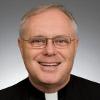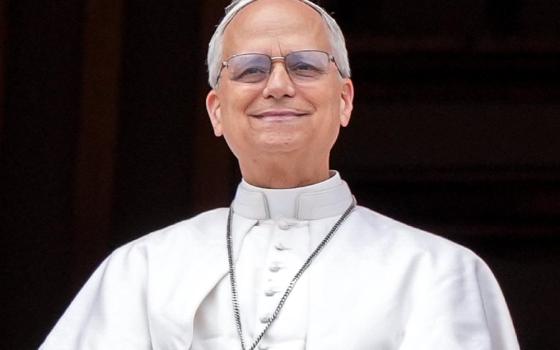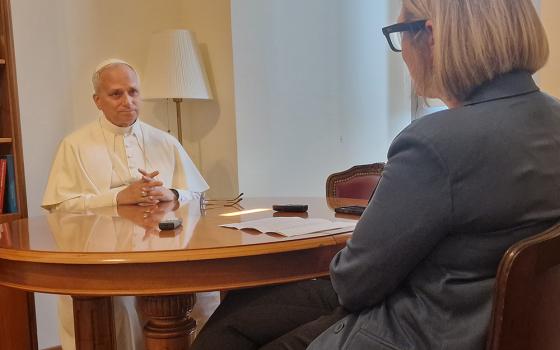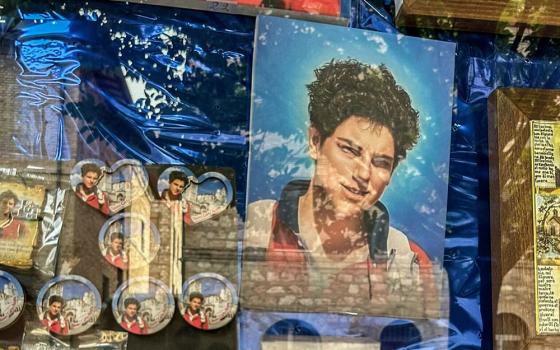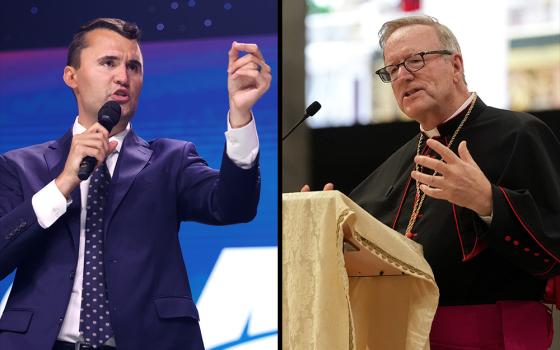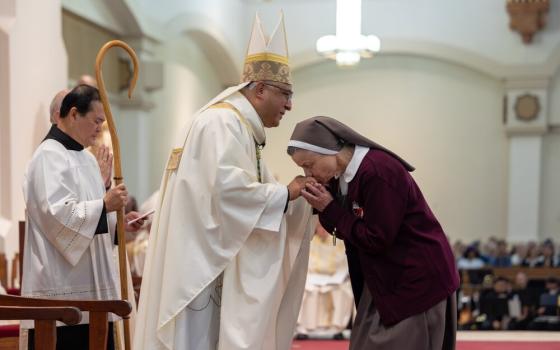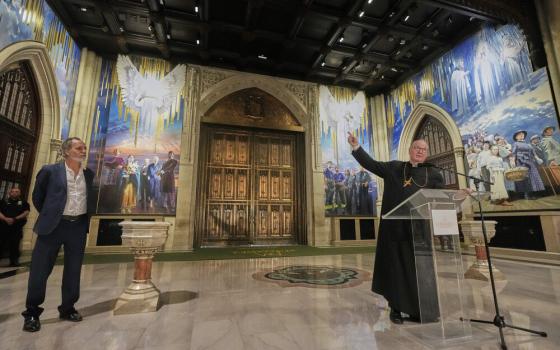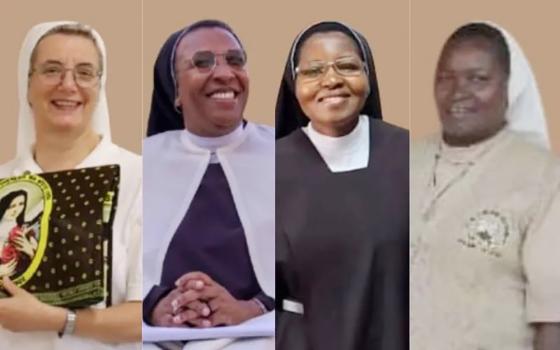Cardinal Wilton Gregory, retired archbishop of Washington, speaks at a news conference May 9 at the Pontifical North American College while his successor, Cardinal Robert McElroy, listens. (CNS/Kendall McLaren)
When someone does something nice, you should thank them. When someone does something courageous, you should praise them. When someone does something historic, you should remember it.
That's why I want to thank, praise and remember the evening prayer service Jan. 22 at Holy Trinity parish in Georgetown, Washington, D.C. It was presided over by Cardinal Wilton Gregory, the recently retired archbishop of Washington. The prayer service was an attempt to bring reconciliation between the archdiocese and LGBTQ Catholics in the Washington area. To that end, the archbishop invited the two area chapters of DignityUSA — Washington and Northern Virginia — to the evening prayer.
DignityUSA is a nationwide spiritual ministry to LGBTQ Catholics and their families. To understand why this evening prayer was so significant a little history is required. It healed a 37-year-old spiritual wound.
DignityUSA began in San Diego, California, in 1969, the year of the Stonewall uprising in New York City that gave rise to the gay rights movement. It quickly spread to other American cities. The Washington, D.C., chapter was founded in 1972, only three years later.
At first, Dignity Washington met for Sunday Mass at the Newman Center at the nonsectarian George Washington University near the White House. It was part of the campus ministry. Among the founders of Dignity Washington was Sr. Jeannine Gramick, who later founded New Ways Ministry with Fr. Robert Nugent.
The Dignity Washington community grew rapidly. It very soon needed a larger space and moved to Georgetown University, a Jesuit-founded university. By the mid-1980s, the Dignity Masses attracted as many as 500 people. Priest celebrants came from the religious houses in the Washington, D.C., area. Such a large gathering of LGBTQ Catholics could not escape the notice of the archdiocese.
Dignity functions like a parish for the LGBTQ community. In the 1980s, discrimination against LGBTQ people was still legal and commonplace. LGBTQ people were not welcomed in most parish churches, unless they were entirely in the "closet." Dignity offered a welcome. Beyond the Sunday Masses, Dignity offered retreats, rosary groups, a book club and prayer support. It offered a spiritual home.
In 1984, Washington Archbishop James Hickey ordered New Ways Ministry to cease operations in the archdiocese. The cardinal carried his complaints to Rome.
In 1986, the Vatican's Congregation for the Doctrine of the Faith, then headed by the future pope, Cardinal Joseph Ratzinger, issued a statement on the "Pastoral Care of Homosexual Persons." The letter was addressed to Catholic bishops worldwide but particularly focused on the United States where Dignity and New Ways Ministry were gaining attention. The letter told bishops not to allow Catholic facilities to be used by any group that was opposed to or "ambiguous about" the church's teaching on the immorality of homosexual activity.
The letter was made public on Oct. 30, 1986, the day before Halloween, but it did not hit the press until Oct. 31. The letter is sometimes known in the LGBTQ community as the "Halloween Letter." Its biggest impact was on the U.S. Some bishops immediately complied and tried to shut down both organizations. Some bishops, like Matthew Clark of Rochester, New York, continued to allow Dignity to hold Mass in their dioceses.
In Washington, D.C., Hickey told parish churches that they were not to allow either organization to hold any events in our spaces. I remember receiving a letter to that effect from the archdiocese when I was a temporary administrator in a parish.
Hickey instructed the president of Georgetown University, Jesuit Fr. Timothy Healy, to order Dignity off campus. Healy complied and delivered the order to the Dignity community in person, addressing them from the chapel altar at the end of a Sunday Mass in 1987. Three years later, Healy gave the John Courtney Murray lecture at Fordham University in New York. In that lecture, Healy said, "For the first time in my life as a priest I felt what I was doing at that altar was obscene …" He also said he wondered "what happened to my church." Healy died in 1992.
On June 22, 1987, Dignity Washington held a religious procession across Washington, D.C., from Georgetown University to St. Margaret's Episcopal Church, near Dupont Circle. The procession included banners and songs. It was a sad procession. I recall seeing it on the local evening news and thinking it was wrong.
St. Margaret's Episcopal Church has hosted the Dignity community since 1987. Dignity rents their church for Sunday evening Masses and for many holy days, special feasts and family events, like funerals. I celebrated a funeral there. It is a lay-run parish.
So much had happened in those 37 years since Dignity was expelled from Georgetown. The AIDS epidemic, the gay rights movement, acceptance of LGBTQ people in the military, and same-sex marriage made legal by the Supreme Court. Pope Francis famously said, "Who am I to judge?" when asked about gay priests. Gramick became a pen pal to Francis and twice met with the pope in Rome. It is a changed landscape.
So, in that changed landscape, it seemed time for reconciliation. Just after Labor Day 2024, Gregory met with Gramick, New Ways Ministry director Frank DeBernardo and me about a number of issues. At the end of our meeting, almost as an afterthought, I asked Gregory if he would be willing to preside at a liturgy of reconciliation between the archdiocese and the LGBTQ community. He said yes without hesitation.
Advertisement
The evening prayer was solemn. The chant was beautiful. The Scriptures were read by Dignity members. Some people cried. For 37 years, the Dignity community prayed at every liturgy for the archbishop of Washington. Finally, they could pray with the archbishop of Washington.
Gregory preached an exceptional homily. He gave something of an "apologia pro vita sua," his own spiritual journey. He spoke of his conversion to Catholicism at a young age (sixth grade), his love of the church and the priesthood, his mentors in Chicago and among bishops. But his optimism was challenged when, as head of the U.S. bishops' conference, he had to deal with the manifold sins of the clergy. He also saw the institutional sins, cover-ups and failings of the institutional church.
The end of the homily was extraordinary. He asked forgiveness for some of the actions of his predecessors in regard to the LGBTQ community and Dignity. He also asked forgiveness for his own failings and sins.
I was blown away. Over the years I've heard many homilies by bishops. But I have never heard such a humble homily and an attempt at reconciliation. When we left the chapel, the cardinal shook the hands of everyone at the door. At my turn, fighting back tears, I said to him, "You have no idea how much this means to me and to many other people."
So, belatedly, I want to thank Gregory for his pastoral care and kindness. I want to praise him for his courage in seeking reconciliation. And I want to recognize him for a historic turning of the page which opens the door to healing a spiritual wound.
Gregory showed himself to be a good shepherd, caring for all the members of his flock, some of whom thought they were forgotten.
